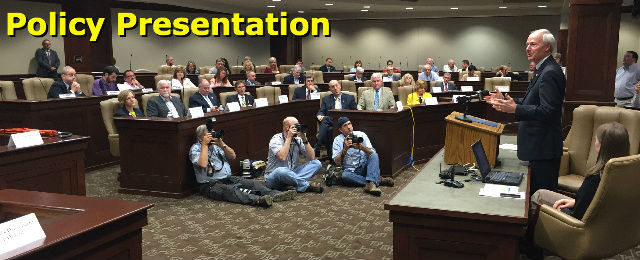Gov. Hutchinson: Keep Medicaid Expansion If Feds Allow For Waivers
by August 19, 2015 1:09 pm 177 views

Gov. Asa Hutchinson laid out a seven-point plan Wednesday that would continue Arkansas’ participation in the Medicaid expansion through the private option while requiring recipients to participate in employer-sponsored plans and pay premiums.
Hutchinson testified before the Health Reform Legislative Task Force, a group considering changes to the private option in the context of overall health care reform. The task force was formed this spring as part of a compromise to fund the private option through 2016. The private option uses Medicaid dollars through the Affordable Care Act to buy private health insurance for Arkansas households with incomes up to 138% of the federal poverty level.
Hutchinson said he continues to oppose the Affordable Care Act, otherwise known as Obamacare, but added, “We need to deal with the reality but push to expand the flexibility given to our states.”
Hutchinson said the state must continue to participate in a federal-state partnership in a way that allows the state to pay for current costs, provide coverage to current beneficiaries, incentivize work, and save on costs. He described the private option as a “pilot program” that needs to be changed.
The seven proposals were:
Require those eligible for the private option to participate in employer-sponsored insurance when available, while the state provides assistance to help them pay their premiums that would be equal to the current coverage they receive through the private option. This would require a Section 1115 waiver from the federal government.
Require private option recipients with incomes of more than 100% above the federal poverty level to pay premiums up to 2% of household incomes.
Implement work training referrals for unemployed and underemployed private option recipients.
Eliminate non-emergency medical transportation benefits, which would save $14.7 million annually, discourage unnecessary medical visits, and make coverage comparable to private plans.
Limit access to private market coverage to working individuals. The unemployed would be enrolled in traditional Medicaid. Those currently in the private option segment of the population (with incomes between 100% and 138% of the federal poverty level) might not have 100% of their current premium subsidy. Hutchinson suggested a sliding scale tied to income as a potential cost savings.
Create cost savings of at least $50 million a year through reforms such as reducing reimbursements, implementing managed care organizations, and/or expanding the state’s payment improvement initiative. Hutchinson said that while legislators don’t have to agree to all of those proposals, “You’ve got to say yes to something because we have to realize the savings.”
Strengthen the Medicaid program’s integrity with audits and checks. Hutchinson said that as of July 1, there were more than 250,000 Arkansans on the private option, a number he thinks will shrink to 220,000 as Arkansas redetermines eligibility based on income. The cost difference between those totals is $15 million per month, or $180 million a year.
Hutchinson, who graduated college with an accounting degree, presented a cost-benefit analysis.
Saying no to the Medicaid expansion would be costly. Ending Arkansas’ participation would remove $1.4 to $1.7 billion out of the state’s economy and end health care coverage for 220,000 people. Participating in the Medicaid expansion will have a positive impact on the state budget of $115 million in 2015 and will have a positive impact of $124 million in 2016, he said.
But that number shrinks each year as Arkansas becomes responsible for some of the cost of the program, which is currently funded by the federal government. By 2021, the private option will have a negative impact of $50 – $60 million each year on the state budget.
He said his proposals can be done without a state-run health insurance exchange, the online marketplace where individuals and small businesses can purchase coverage. Most states, including Arkansas, participate in the federal exchange, healthcare.gov, but Arkansas is building a state version with a $99 million grant from the federal government. Hutchinson questioned why the state exchange is necessary.
“Why are we building the state exchange rather than relying on the continued partnership with the federal government?” he asked.
Hutchinson told legislators that they are “on a short timeframe.” He said the task force needed to make its recommendations in time to pass legislation next year. He said legislators need to work with the Obama administration rather than wait for the next one, which may or may not be more flexible.
“Please be politically realistic, be cost-minded, but please set aside why and how we got here,” he said.
